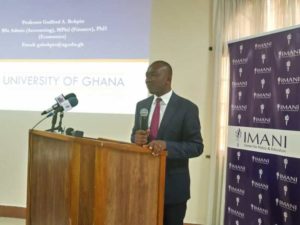Prof Bokpin doubts Ghana’s resolve not to go IMF again

Professor Godfred A. Bokpin, an IMANI Fellow, has expressed doubts about Ghana’s resolve to never go back to the International Monetary Fund (IMF) after doing so 16 times.
He said he would believe a married couple who say they wouldn’t be having a fourth child, than he would the country, Ghana.
Professor Bokpin said it was inevitable to borrow because of the numerous promises politicians make.
He said a careful study of Ghana’s love relationship with the IMF reveals that it dates back to the mid-1960s, and since then on the average, every three years and nine months Ghana’s goes back to the IMF for help.
Prof Bokpin said this in his inaugural IMANI Fellowship Lecture on “How the 2019 Budget Addresses Sustainability Concerns Post-IMF Programme.”
The 2019 Budget Statement of Ghana is the first budget after the three-year IMF extended credit facility.
Given the exclusion of the IMF conditionalities from the 2019 Budget, there are key concerns on debt sustainability, fiscal discipline, and enhanced revenue mobilisation.
The lecture sought to examine the extent to which the 2019 Budget addresses these concerns.
Prof Bokpin said going forward Government could consider the IMF Policy Support Programme (PSP).
He said the PSP offers low-income countries that do not want—or need—Fund financial assistance a flexible tool that enables them to secure Fund advice and support without a borrowing arrangement.
Prof Bokpin said this non-financial instrument was a valuable complement to the IMF’s lending facilities under the Poverty Reduction and Growth Trust.
He said the PSP helps countries design effective economic programmes that deliver clear signals to donors, multilateral development banks, and markets of the Fund’s endorsement of the strength of a member’s policies.
He noted that the PSP allowed them to continue their periodic review.
Prof Bokpin said growing the economy and exporting would improve our rankings on the DSI.
He said maintaining stable exchange rate was key given the composition of Ghana’s debt stock.
He said the Government needed to devise responsible funding alternatives to bridge the huge infrastructural deficit.
“The rate at which we borrow to finance the infrastructural deficit has implication for boosting productivity growth,” Prof Bokpin added.
Source: GNA
